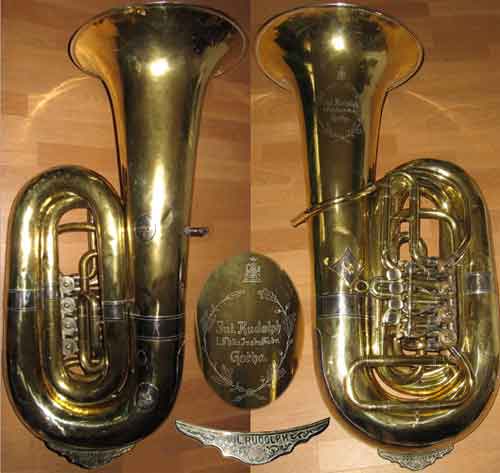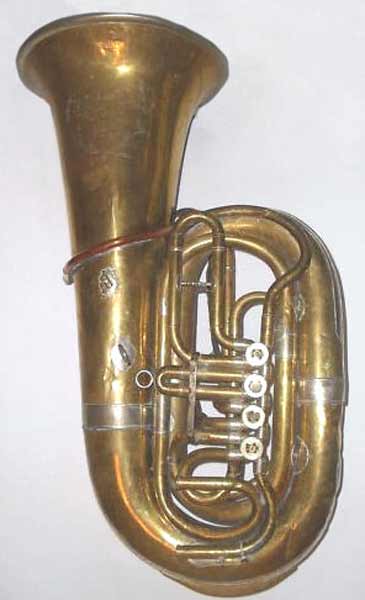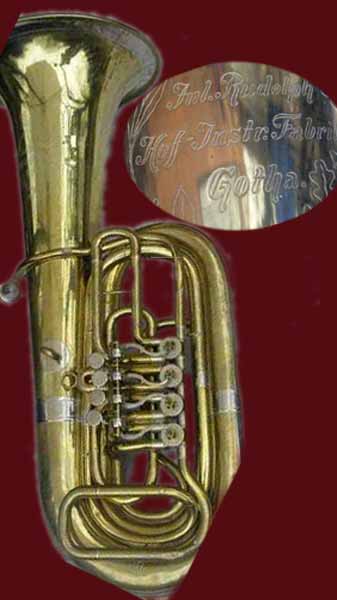Tuba Tuesday: J. Rudolph, F tuba, 4 rotary valves, ca. 1920s
Posted: Tue Apr 12, 2022 3:16 am
This Tuba Tuesday the Museum features a J. Rudolph, F tuba, 4 rotary valves, ca. 1920s with a bell of 13” and a .635 bore.


From Horn-U-Copia: “Julius Rudolph Founded his musical instrument shop and workshop in 1872 at the age of 28. He died in 1900 at the age of 56. The company with several employees, was continued by his son, Gotthard Rudolph, who was born in 1882. Rudolph Logo
In 1911 a new factory building with two additional floors. Almost all parts were manufactured in-house. They were one of the first German factories to use electric power rather than steam power to drive machinery. To emphasize this innovation, they engraved their products from 1911 to 1931 with "Orchesterinstrumentenfabrik mit elektrischem Kraftbetrieb Julius Rudolph Hofinstrumentenmacher Gotha" (trans. orchestral instrument factory with electric motor operation Julius Rudolph Instrument Maker Gotha )
During the Depression their workforce was reduced from 15 to 2. But because of big sales to military bands in the early 30’s, the company grew again. In 1938, the company owner and his son, who was supposed to take over the company, were killed in a car accident in the vicinity of Berlin. Gotthard second son named Julius, after his grandfather, now led the company.
The 2nd World War hit the company hard. They lost workers to the war effort. Towards the end of the war Julius Rudolph died. His widow now led the workshop with the assistance of Mr. Raymond Thomas, who came to the workshop in 1926, having learned the trade in the Bavarian town of Dillingen on the Danube. In 1949 he passed his master’s examination and led the company independently from 1953.
In September 1965 John Keilwerth began his apprenticeship as a metal brass instrument maker. In 1975, he completed his master’s examination and on April 1st, 1977 John Keilwerth took over the workshop. In 1978/79, the workshop buildings were demolished and a new his workshop was established at Three Crown Alley. In 1988, the business moved again to Monk Allee 17 in the Siebleben district, where they are presently located.“
https://simonettitubacollection.com/ins ... -ca-1920s/


From Horn-U-Copia: “Julius Rudolph Founded his musical instrument shop and workshop in 1872 at the age of 28. He died in 1900 at the age of 56. The company with several employees, was continued by his son, Gotthard Rudolph, who was born in 1882. Rudolph Logo
In 1911 a new factory building with two additional floors. Almost all parts were manufactured in-house. They were one of the first German factories to use electric power rather than steam power to drive machinery. To emphasize this innovation, they engraved their products from 1911 to 1931 with "Orchesterinstrumentenfabrik mit elektrischem Kraftbetrieb Julius Rudolph Hofinstrumentenmacher Gotha" (trans. orchestral instrument factory with electric motor operation Julius Rudolph Instrument Maker Gotha )
During the Depression their workforce was reduced from 15 to 2. But because of big sales to military bands in the early 30’s, the company grew again. In 1938, the company owner and his son, who was supposed to take over the company, were killed in a car accident in the vicinity of Berlin. Gotthard second son named Julius, after his grandfather, now led the company.
The 2nd World War hit the company hard. They lost workers to the war effort. Towards the end of the war Julius Rudolph died. His widow now led the workshop with the assistance of Mr. Raymond Thomas, who came to the workshop in 1926, having learned the trade in the Bavarian town of Dillingen on the Danube. In 1949 he passed his master’s examination and led the company independently from 1953.
In September 1965 John Keilwerth began his apprenticeship as a metal brass instrument maker. In 1975, he completed his master’s examination and on April 1st, 1977 John Keilwerth took over the workshop. In 1978/79, the workshop buildings were demolished and a new his workshop was established at Three Crown Alley. In 1988, the business moved again to Monk Allee 17 in the Siebleben district, where they are presently located.“
https://simonettitubacollection.com/ins ... -ca-1920s/


